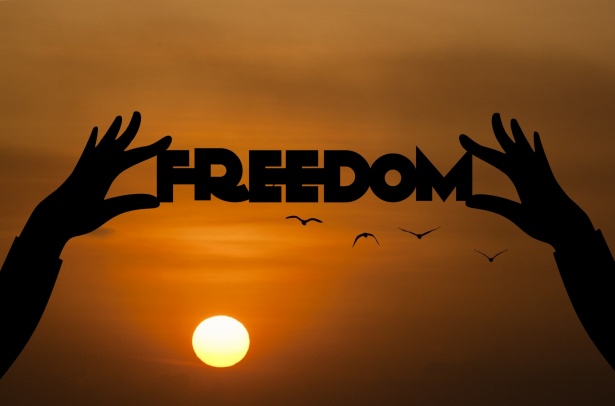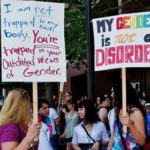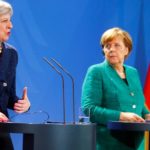
“A soul-piercing battle cry from powerless and downtrodden citizens sends shockwaves through a broken city. An emotive call to arms that cannot help but spur men, women, and children alike to support a democratic revolution against authoritarian tyranny and oppression. A fleeting yet ideal-laden cry that had such a profoundly compelling impact on the hearts and minds of all those who heard it: for freedom.”
Above, you will find the somewhat awkward insertion of a fictionalised depiction of freedom into a piece of journalistic writing. An excerpt of a story characterised by anonymity, with no specified characters or locations. An excerpt that lacks any deeper context or clarified relevance to a real-life event, as one might expect in a political journal. However, this expectation would be flawed: political power is invariably intertwined with both context-avoidance and the art of fiction. Arguably, the person who wages the most political power in a democracy is the person who can craft the narrative that appeals to the greatest number of people with political privileges. This was a phenomenon that political economist Joseph Schumpeter wrote about, as he regarded humans as easily manipulable by politicians with propaganda due to their emotional vulnerability — which he saw as clouding rational judgment and giving rise to tribal behaviours. This means that so-called nebulous concepts, particularly emotive or value-laden ones, are applied to situations that require public support because they possess such strong rhetorical power. In an age of misinformation and echo chambers, Schumpeter’s thoughts, albeit perhaps too cynical for some, remain almost tangible.
It should be said, this article interrogates freedom as a concept and rhetorical device that is exploited for oppressive or harmful purposes. There are, of course, very legitimate freedom claims that demand social, political, and legal equality of rights for those who are being denied them. For example, the Civil Rights Movement in the US in the 1950s and 1960s saw the battle against racial injustice and inequality to provide African Americans with rights that would enshrine freedom and equality. This article will deal not with such cases of freedom-from-oppression, but rather with the grey area in which freedom is exclusionary, hypocritical, or used as a political strategy.
Unlimited universal freedom is not a self-sustaining idea. For one person to be able to do anything they want, this must surely also include the right to oppress or harm others, thus impeding upon the freedom of others in the act of preserving one’s own. There are strains of thought — such as right-wing libertarianism — that champion minimal limitations on an individual’s power, even if these ironically remove freedoms of others. George Monbiot gives the economic example of freedom from state regulation as harming public funds and workers: the very wealthy do not have to pay high taxes and businesses are able to have full control over workers, including cuts to minimum wage and increases in working hours. Meanwhile, for others, a constrained version of autonomy is necessary to uphold freedom; Priyamvada Gopal draws attention to the ways in which acts of “un-freedom”, such as enhanced security and military force, can sometimes be seen as vital for ensuring freedoms such as bodily integrity and personal safety. However, as we will see, sometimes these allegedly constructive measures of “un-freedom” do not necessarily promote equal freedom.
The opening excerpt, which randomly and ambiguously describes the rallying power of freedom against a deemed oppressor, epitomises the very notion of freedom itself. References to freedom are awkwardly inserted into political appeals that mask the reality of a situation, so that a certain political agenda can be furthered. The ideal of freedom when used as a rallying cry against oppression, as supposedly seen in the opening paragraph, may seem rightfully reasonable — even as a fundamental necessity — and crucially, emotionally affective.
However, the same reason and emotion connoted by ‘freedom’ in a seemingly escape-from-oppression scenario is, unfortunately, also evoked in an excuse-for-oppression scenario or an excuse-to-harm-others scenario, often masquerading as the former. Think of the branch of the Republican anti-mask, anti-vax and anti-COVID restrictions crowd who claimed that their freedom over bodily autonomy was being inhibited despite COVID measures being for public health reasons. Yet, in the same — presumably mask-free — breath, they may also oppose the right to a legal abortion. The irony is clear from Republicans who are anti-vaxxers and anti-maskers while also being against the pro-choice movement, despite access to legal abortions supporting actual individual freedom that protects individual choice in a matter of individual healthcare. They have deployed the reproductive rights slogan ‘My body, my choice’, despite being against women’s reproductive rights — with Republican-controlled states having toughened abortion restrictions in recent history. They also perhaps constitute part of the many Republicans that disagreed with the necessity for an ‘Equal Rights Amendment’. Appeals to self-interest and emotion, compounded by different values and lack of educational engagement, make it difficult to even have a coherent, open-minded, and progressive conversation when freedom claims are invoked. Freedom means very different things to different people, and can often just depend on what it is that the person invoking the claim wants for themselves — not because they have a passion for equal freedoms.
The “powerless and downtrodden citizens” from the opening paragraph — who we would likely automatically sympathise with — might well take power in the name of freedom from tyranny and liberty for ‘the people’, only to then take an exclusionary view of who ‘the people’ are once they do gain control. An all-too-common occurrence, blatant examples of this include those from the so-called ‘Land of the Free’, in which the 1776 American Declaration of Independence held that “All men are created equal”, and thus people had the rights to “Life, Liberty, and the pursuit of happiness”. Of course, this hypocrisy is fitting for a nation-state that was borne from settler colonialism that saw the snatch of Native American lands and ethnic cleansing of indigenous populations. It would appear the idealised vision of equality and rights to freedom upon which the United States was founded only extended to those of white European as opposed to Native American or African American heritage.
The formal abolition of slavery in the United States came with the 13th amendment in 1865. Alongside this, however, came the foundations of the Jim Crow laws, instated to ensure that African Americans would not be granted the same freedoms as white Americans. These laws legalised racial segregation and institutionalised the refusal of voting rights, of employment rights, of educational rights and of other freedoms of opportunity. These laws did not end until 1968. The US continues to suffer from this systemic racism that plagues its societies and institutions. The very institution that exists to enforce protection of people’s freedoms — down to the right to live, arguably the most sacred of freedoms — continues to be disproportionately more likely to inflict violence and brutality on people of colour. Those who are Black, American Indian Natives or American Alaska Natives are significantly more likely to be killed by the police than white people, as are Latino men compared to white men.
This narrow definition of ‘freedom’ is notably also apparent in the attitude of U.S. institutions to those outside of their borders, seen in instances such as President George Bush’s rhetoric in the aftermath of the horrific attacks of September 11th, 2001. Indeed, the opening sentence of Bush’s 9/11 address to the nation notes how “our very freedom came under attack”. Bush subsequently declared a ‘War on Terror’, and two US-led military campaigns in Afghanistan (2001) and Iraq (2003) shortly ensued. These wars are officially framed as part of a wider ‘Freedom Agenda’ to defend Americans and facilitate the international spread of liberal democracy in order to aid the citizens of other nations. Naturally, the Global War on Terrorism took on the official name under the U.S. Government of ‘Operation Enduring Freedom’. As a result of these wars, 38 million people have been forcibly displaced and over 387, 000 civilians have been killed. Many more have also been injured or contracted illnesses, and countless have been indirectly killed due to hospitals and other vital infrastructure becoming war zone collateral. People have lost their homes and their lives in the fulfilment of a term whose imposition they did not even consent to — civilians have lost freedoms down to their right to live in the name of freedom. This is not a comment on the morality of such wars or their potential humanitarian elements and benefits, but rather, an exposure of the inherent hypocrisy that exists in the concept of freedom. Any achieved freedoms in these cases come at the cost of war.
The conflict between collective rights (in the name of national security) and individual rights (such as freedom from torture) is a known scandal. The US government sanctioned so-called ‘enhanced interrogation techniques’ on terrorist suspects in the aftermath of the September 11 attacks. Enhanced interrogation has been deemed to have involved torture and war crimes by national courts and international organisations alike. These ‘non-torturous’ techniques included waterboarding, mock asphyxiation and exploitation of individual phobias (e.g. dogs). However, those who ironically support torture in the name of so-called collective rights when it comes to ‘national security’ won’t necessarily support the subordination of individual rights to ‘collective rights’ when it comes to matters that affect them personally, such as vaccinations and mask-wearing for the sake of public health.
Throughout this piece, we have explored the theme of ‘freedom’ being unapologetically exclusionary, incoherent, and even self-negating due to its nebulosity. The oft-cited quote “one man’s terrorist is another man’s freedom fighter” perfectly encapsulates the duality of a term that is widely accepted as a positively ‘rosy’ higher ideal, yet regularly manifests in tandem with its antithesis: oppression.



Isaiah Berlin’s ‘Two concepts of liberty’ is a classic contribution to making sense of the concept of freedom. https://berlin.wolf.ox.ac.uk/published_works/tcl/tcl-a.pdf